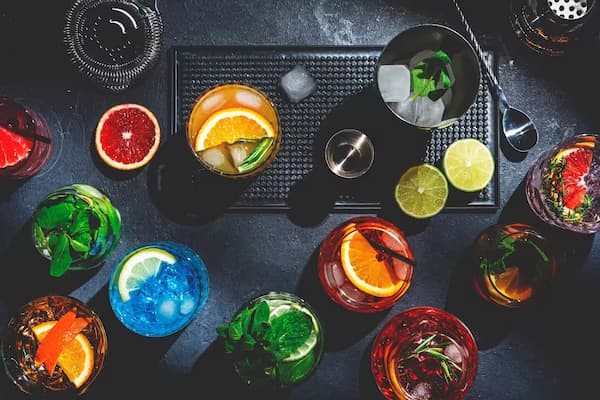Water
With Water you can make
Mystique in Every Sip
Absinthe Drip
Absinthe, Sugar, Water
Satisfyingly sweet with a spicy kick
Swicy Berry Lemonade
Lemon Juice, Raspberry, Honey, Water, Chilli peppers
Tropical refreshment, smoky allure.
Snake Eyes
Mezcal, Banana liqueur (crème de banane), Sugar / simple Syrup, Lime juice, Water
A sailor's delight with robust flavor
Grog
Overproof rum, Angostura Bitters, Sugar / simple Syrup, Lime juice, Water
A mesmerizing, zesty last word
Ultima Palabra
Green Chartreuse, Mezcal, Lime juice, Pineapple Juice, Water, Maraschino Cherry
Aromatic Elegance with a Bold Finish
Alaska
Yellow Chartreuse, Dry gin, Orange Bitters, Water
A sip of golden triumph.
Golden Smash
White rum, Apple liqueur, Cola, Sugar / simple Syrup, Lemon, Water, Basil leaves
Simplify your whiskey experience.
Mizuwari
Whiskey, Water
A fiery spectacle for the senses.
Blue Blazer
Whiskey, Sugar, Water
Spice up the holidays with a pear-infused delight.
Partridge in a Pear Tree
Bourbon, pear brandy, sparkling pear hard cider, Lemon Juice, Honey, Water, Cinnamon, Ginger, Nutmeg
We've got 10 cocktails that can be made with Water.
Find out what to make with Water
Q&A
What is the historical significance of water in cocktails?
Water has been an intrinsic part of alcoholic beverages and cocktails for centuries, primarily due to its role in dilution and purification. Historically, adding water to spirits was a way to make them safer and more palatable to drink, as pure alcohol can be overwhelming and dangerous in large quantities. In the 18th and 19th centuries, spirits were often much stronger than they are today, and water was used to dilute these beverages to a more manageable strength. The practice of diluting spirits with water paved the way for the creation of cocktails, where water, along with other ingredients like sugar and bitters, was used to enhance and balance flavors.
How does the way water is introduced into a cocktail affect its taste?
The method by which water is introduced into a cocktail can significantly impact its taste and overall balance. When water is added in the form of ice and then either shaken or stirred, it chills the drink while simultaneously diluting it, allowing for a smoother and more harmonious blend of flavors. The amount of dilution can be controlled by the duration of shaking or stirring. Direct addition of water, whether still or sparkling, can lighten the drink's intensity and add a refreshing element, making the cocktail more approachable while subtly shifting its flavor profile. The quality of water used can also affect taste, emphasizing the importance of using filtered or spring water free from impurities that could alter the intended flavors of the cocktail.
Why is the quality of water important in cocktail making?
The quality of water is crucial in cocktail making because it can significantly influence the drink's flavor and overall experience. Water that contains chlorine, heavy metals, or other impurities can introduce undesirable tastes and aromas, detracting from the cocktail's intended profile. Using high-quality, filtered or spring water ensures that these impurities are minimized, allowing the true flavors of the spirits and mixers to shine through. Moreover, the clarity and purity of good-quality water contribute to the aesthetic appeal of the cocktail, making it more inviting and enjoyable to drink.
Can water play a role in non-alcoholic versions of cocktails?
Absolutely, water can play a crucial role in non-alcoholic or mocktail versions of cocktails. Just as with alcoholic cocktails, water can be used to dilute potent flavors, balance sweetness and acidity, and contribute to the overall volume and refreshment of the drink. For mocktails, sparkling water or tonic water can add a fizzy, lively texture, making the drink more festive. Additionally, the use of herbal or floral-infused waters can introduce unique flavors and aromas, adding complexity and depth to non-alcoholic cocktails without the need for spirits.
How can the presentation of water in cocktails be enhanced for better serving?
Enhancing the presentation of water in cocktails can elevate the drinking experience, making it visually appealing and engaging. For cocktails where water is a visible component, using clear, high-quality ice can make a significant impact. Ice cubes can be customized with embedded flowers, fruits, or herbs, adding a touch of elegance and intrigue. When serving highballs or cocktails with a significant water component, using attractive, chilled glassware can accentuate the drink's refreshing nature. For a sophisticated touch, consider offering a small pitcher of water, allowing guests to adjust the dilution to their preference. Sparkling or infused waters served in elegant bottles or decanters can also add a sense of occasion, making even the simplest water addition feel special.
Ingredients like Water
Other Kitchen cupboards
How it works
Easily create your bar from the ingredients you have at home, and we'll show you what you can make with the ingredients you have to hand.
Once you've added this ingredient head to your My bar page and fill up everything else you have.
We'll also show you cocktails that can make by substituting what you have for one of the ingredients you don't, riffing on the original. Now go forth and create something delicious!


















































